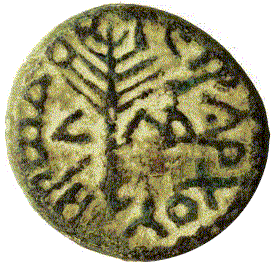second son of
Herod
& Malthace
second husband of Herodias
The youngest
surviving son of Herod
was, like his brother Archelaus,
raised as a private citizen in Rome. When his half-brother Antipater
III fell from their father's
favor (5
BCE), he became
Herod's designated chief heir. The
dying king's decision to alter his will to make Archelaus king
precipitated sibling rivalry before the emperor in Rome. Augustus
confirmed Herod's last will by making Antipas ruler only of Galilee
& the Region [Greek: Perea]
across the Jordan. The territory controlled by Herod was roughly one
quarter of Herod's kingdom. Hence, his title: tetrarch [lit.:
"quartermaster"].
Though only governor of two small provinces,
Antipas locally styled himself "king" & used the name
"Herod," to bolster his claim that he was the true heir to
his father's legacy. With the aid of Roman armies he crushed
Galilean rebels & then turned to urbanizing southern Galilee,
rebuilding the regional capitol [Sepphoris]
that the Romans had destroyed in the civil war & dedicating it
to the emperor Augustus [calling it Autocratoris: "the
Emperor's city"]. After his Roman patron Tiberius
became emperor (14 CE), Antipas decided to build a new & even
more splendid Roman style capital for Galilee on the western shore
of Lake
Gennesaret, naming it Tiberias.
To protect his southern flank he formed an alliance with the Arab
kingdom of Nabatea by marrying the daughter of the king of Petra,
Aretas III, whom he later divorced to marry
Herodias,
the wife of his half-brother [Herod Boethus], in total disregard for Jewish Torah.
Like his father Antipas was wary of conservative Jewish critics of his
regime & quick to crush popular rabble-rousers, most notably
John (Johanan) the Baptizer. His Jewish subjects never forgave him
for executing one whom they regarded as God's agent. When Aretas
avenged his daughter's disgrace by dealing Herod a decisive defeat (36 CE), many regarded it as divine retribution for John's
execution. Antipas' royal pretensions were further frustrated when
the new emperor, Gaius
(Caligula), named his
brother-in-law, Agrippa
I, "king" over the
neighboring provinces (37 CE). Antipas' protest of the young
emperor's decision & his demand for equal rank, however, caused
Caligula to depose him & send him into exile. He died soon after at Lyons [in
Gaul (France)].
References:
Josephus,
Antiquities
17.20,
188,
224-238,
318;
18.27,
36-38,
102-122,
148-150,
202-255.
______, War
1.562;
2.20-22;
94-95,
167-168,
178-183.
______, Life
37,
65.
For a detailed
biography & further information on recent scholarship see:
-
Hoehner, Harold W.
Herod Antipas: A Contemporary of Jesus Christ.
Cambridge, UK: Cambridge University Press, 1972.
-
Jensen, Morgen H. Herod
Antipas in Galilee: Literary and Archaeological Sources.
Tübingen: Mohr-Siebeck, 2006.
Other resources on line:
![]()
![]()

![]()
![]()
![]() Perspective on the
World of Jesus
Perspective on the
World of Jesus ![]()